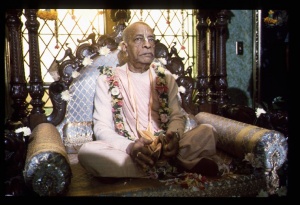CC Antya 16.26: Difference between revisions
m (1 revision(s)) |
No edit summary |
||
| Line 1: | Line 1: | ||
{{ | [[Category:Sri Caitanya-caritamrta - Antya-lila Chapter 16|C026]] | ||
<div style="float:left">'''[[Sri Caitanya-caritamrta|Śrī Caitanya-caritāmṛta]] - [[CC Antya|Antya-līlā]] - [[CC Antya 16|Chapter 16: Lord Śrī Caitanya Mahāprabhu Tastes Nectar from the Lips of Lord Śrī Kṛṣṇa]]'''</div> | |||
<div style="float:right">[[File:Go-previous.png|link=CC Antya 16.25|Antya-līlā 16.25]] '''[[CC Antya 16.25|Antya-līlā 16.25]] - [[CC Antya 16.27|Antya-līlā 16.27]]''' [[File:Go-next.png|link=CC Antya 16.27|Antya-līlā 16.27]]</div> | |||
{{CompareVersions|CC|Antya 16.26|CC 1975|CC 1996}} | |||
{{RandomImage}} | |||
==== TEXT 26 ==== | ==== TEXT 26 ==== | ||
<div | <div class="verse"> | ||
viprād dvi-ṣaḍ-guṇa-yutād aravinda-nābha- | :viprād dvi-ṣaḍ-guṇa-yutād aravinda-nābha- | ||
pādāravinda-vimukhāt śva-pacaṁ variṣṭham | :pādāravinda-vimukhāt śva-pacaṁ variṣṭham | ||
manye tad-arpita-mano-vacanehitārtha- | :manye tad-arpita-mano-vacanehitārtha- | ||
prāṇaṁ punāti sa kulaṁ na tu bhūri-mānaḥ | :prāṇaṁ punāti sa kulaṁ na tu bhūri-mānaḥ | ||
</div> | </div> | ||
| Line 14: | Line 18: | ||
==== SYNONYMS ==== | ==== SYNONYMS ==== | ||
<div | <div class="synonyms"> | ||
''viprāt''—than a ''brāhmaṇa''; ''dvi-ṣaṭ-guṇa-yutāt''—who is qualified with twelve brahminical qualifications; ''aravinda-nābha''—of Lord Viṣṇu, who has a lotuslike navel; ''pāda-aravinda''—unto the lotus feet; ''vimukhāt''—than a person bereft of devotion; ''śva-pacam''—a ''caṇḍāla'', or person accustomed to eating dogs; ''variṣṭham''—more glorified; ''manye''—I think; ''tat-arpita''—dedicated unto Him; ''manaḥ''—mind; ''vacana''—words; ''īhita''—activities; ''artha''—wealth; ''prāṇam''—life; ''punāti''—purifies; ''saḥ''—he; ''kulam''—his family; ''na tu''—but not; ''bhūri-mānaḥ''—a ''brāhmaṇa'' proud of possessing such qualities. | |||
</div> | </div> | ||
| Line 21: | Line 25: | ||
==== TRANSLATION ==== | ==== TRANSLATION ==== | ||
<div | <div class="translation"> | ||
"'A person may be born in a brāhmaṇa family and have all twelve brahminical qualities, but if in spite of being qualified he is not devoted to the lotus feet of Lord Kṛṣṇa, who has a navel shaped like a lotus, he is not as good as a caṇḍāla who has dedicated his mind, words, activities, wealth and life to the service of the Lord. Simply to take birth in a brāhmaṇa family or to have brahminical qualities is not sufficient. One must become a pure devotee of the Lord. If a śva-paca or caṇḍāla is a devotee, he delivers not only himself but his whole family, whereas a brāhmaṇa who is not a devotee but simply has brahminical qualifications cannot even purify himself, what to speak of his family.' | |||
</div> | </div> | ||
| Line 28: | Line 32: | ||
==== PURPORT ==== | ==== PURPORT ==== | ||
<div | <div class="purport"> | ||
This and the following verse are quoted from Śrīmad-Bhāgavatam ([[SB 7.9.10 and 3.33.7]]). | This and the following verse are quoted from ''Śrīmad-Bhāgavatam'' ([[SB 7.9.10|7.9.10]] and [[SB 3.33.7|3.33.7]]). | ||
</div> | </div> | ||
__NOTOC__ | |||
<div style="float:right; clear:both;">[[File:Go-previous.png|link=CC Antya 16.25|Antya-līlā 16.25]] '''[[CC Antya 16.25|Antya-līlā 16.25]] - [[CC Antya 16.27|Antya-līlā 16.27]]''' [[File:Go-next.png|link=CC Antya 16.27|Antya-līlā 16.27]]</div> | |||
__NOTOC__ | |||
__NOEDITSECTION__ | |||
Revision as of 06:09, 24 September 2021

A.C. Bhaktivedanta Swami Prabhupada
TEXT 26
- viprād dvi-ṣaḍ-guṇa-yutād aravinda-nābha-
- pādāravinda-vimukhāt śva-pacaṁ variṣṭham
- manye tad-arpita-mano-vacanehitārtha-
- prāṇaṁ punāti sa kulaṁ na tu bhūri-mānaḥ
SYNONYMS
viprāt—than a brāhmaṇa; dvi-ṣaṭ-guṇa-yutāt—who is qualified with twelve brahminical qualifications; aravinda-nābha—of Lord Viṣṇu, who has a lotuslike navel; pāda-aravinda—unto the lotus feet; vimukhāt—than a person bereft of devotion; śva-pacam—a caṇḍāla, or person accustomed to eating dogs; variṣṭham—more glorified; manye—I think; tat-arpita—dedicated unto Him; manaḥ—mind; vacana—words; īhita—activities; artha—wealth; prāṇam—life; punāti—purifies; saḥ—he; kulam—his family; na tu—but not; bhūri-mānaḥ—a brāhmaṇa proud of possessing such qualities.
TRANSLATION
"'A person may be born in a brāhmaṇa family and have all twelve brahminical qualities, but if in spite of being qualified he is not devoted to the lotus feet of Lord Kṛṣṇa, who has a navel shaped like a lotus, he is not as good as a caṇḍāla who has dedicated his mind, words, activities, wealth and life to the service of the Lord. Simply to take birth in a brāhmaṇa family or to have brahminical qualities is not sufficient. One must become a pure devotee of the Lord. If a śva-paca or caṇḍāla is a devotee, he delivers not only himself but his whole family, whereas a brāhmaṇa who is not a devotee but simply has brahminical qualifications cannot even purify himself, what to speak of his family.'
PURPORT